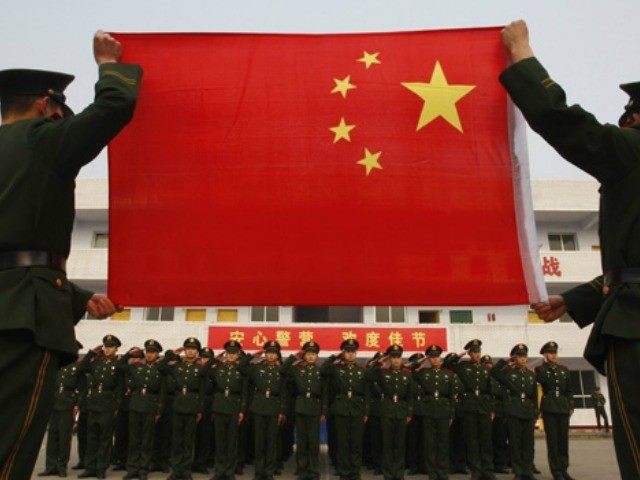Beijing is planning to use its investment plan to revive China’s Silk Road through Pakistan, officially known as the China-Pakistan Economic Corridor (CPEC), to suppress Islamic terrorism, diversity, and democracy in the Muslim-majority country, a leaked documented obtained by DAWN purportedly reveals.
DAWN unveiled the details of China’s alleged plans soon after Pakistani Prime Minister Nawaz Sharif arrived in Beijing last weekend to participate in discussions to finalize the Long Term Plan (LTP) for the new Silk Road, known as Chinese President Xi Jinping’s One Belt, One Road initiative.
In the leaked document, China identifies diversity, multi-party democracy, and security as the top problems facing its estimated $46 billion CPEC investment.
“There are various factors affecting Pakistani politics, such as competing parties, religion, tribes, terrorists, and Western intervention,” states the document. “The security situation is the worst in recent years.”
Forbes points out:
The North Atlantic Treaty Organization (NATO) allies have committed trillions of dollars, and thousands of lives, in Afghanistan and Pakistan to fight terrorism and support democracy in those countries. So for China to associate “Western intervention” in the same breath with terrorism and “competing parties” is both bizarre and insulting.”
China has taken advantage of NATO-funded security in Afghanistan, while supporting the Taliban terrorists, for example, to enable their investment in highly-profitable copper mines that will destroy the ancient Buddhist temple complex at Mes Aynak.
Communist China, the world’s third-largest arms provider, supplies more weapons to Pakistan than any other country and builds the Muslim-majority country’s nuclear reactors. Beijing enabled Pakistan’s indigenous ballistic missile capability and also assisted the South Asian nation in the construction of its first nuclear bomb.
However, the U.S.-China Economic and Security Review Commission reported last year that the increasing Islamic terrorism threat facing China, primarily stemming from Pakistan and to a lesser extent Afghanistan, is prompting the communist country to question its military support to Islamabad given the South Asian country’s “complicated relationship” with jihadi groups.
Although mainland Pakistan does not border China, the communist country’s autonomous province of Xinjiang, home to the largest concentration of the nation’s Muslim Uighur minority, borders Pakistan-occupied Kashmir. Afghanistan also shares a border with China.
The leaked document reveals that Beijing may establish Chinese-supplied surveillance equipment in Pakistan one city at a time as well as deploy Chinese law enforcement as part of security measures for its investments in the Muslim-majority country.
“A full system of monitoring and surveillance will be built in cities from Peshawar to Karachi, with 24 hour video recordings on roads and busy marketplaces for law and order. A national fiberoptic backbone will be built for the country not only for internet traffic, but also terrestrial distribution of broadcast TV, which will cooperate with Chinese media in the ‘dissemination of Chinese culture,’” notes DAWN.
In the final sentence of the chapter on agriculture, the plan says Beijing will “[s]trengthen the safety cooperation with key countries, regions and international organizations, jointly prevent and crack down on terrorist acts that endanger the safety of Chinese overseas enterprises and their staff,” later adds the news outlet.
China also allegedly intends to expand a “safe cities” project across Pakistan — to the capital Islamabad, Lahore, and Karachi. The leaked document suggests that the feeds will eventually be shared with Pakistan and maybe even recorded.
Beijing intends to expand the “safe cities” project across Pakistan, to major cities such s the capital Islamabad, Lahore, and Karachi. The leaked document suggests that the feeds will eventually be shared with Pakistan and maybe even recorded.
DAWN reports:
It also seeks to create an electronic monitoring and control system for the border in Khunjerab, as well as run a “safe cities” project. The safe city project will deploy explosive detectors and scanners to “cover major roads, case-prone areas and crowded places… in urban areas to conduct real-time monitoring and 24 hour video recording.” Signals gathered from the surveillance system will be transmitted to a command centre, but the plan says nothing about who will staff the command centre, what sort of signs they will look for, and who will provide the response.
“There is a plan to build a pilot safe city in Peshawar, which faces a fairly severe security situation in northwestern Pakistan,” the plan says.
The Khunjerab border pass connects Pakistan-controlled Kashmir with China’s Muslim-majority Xinjiang autonomous province
China and its ally Pakistan consider India their military and economic rival.
The China-Pakistan Economic Corridor is expected to run through disputed territory of Pakistan-occupied Kashmir, creating tensions with India.
All three neighboring countries — China, Pakistan, and India — have competing claims to the Muslim-majority Himalayan region of Kashmir.
China has managed to stay in the shadows of recent clashes between India and Pakistan in Kashmir.
Nevertheless, the construction of CPEC may draw China into the conflict.

COMMENTS
Please let us know if you're having issues with commenting.